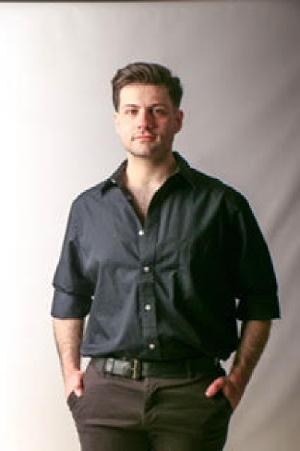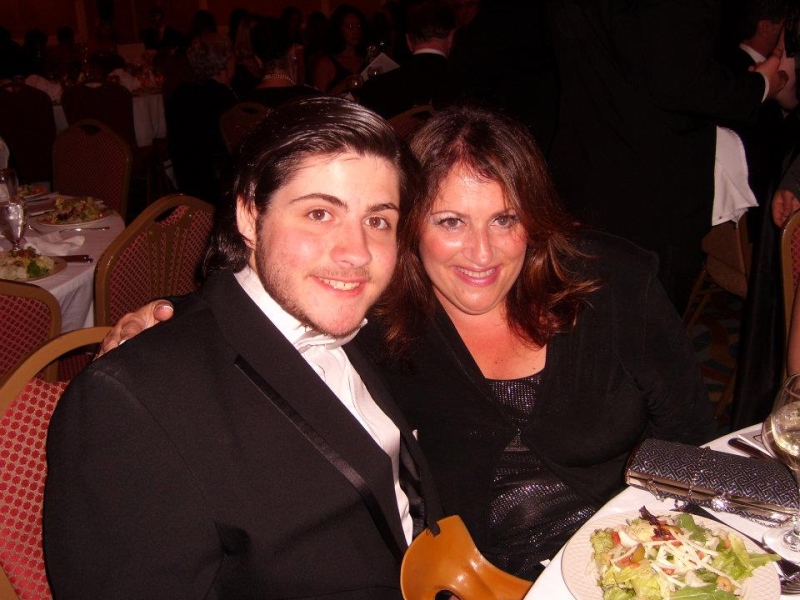Interview: Autism Advocate, New Jersey-Based Singer-Songwriter Cory Singer Releases First Single 'I Still Love You'
The TikToker and musical theater actor opens up to BroadwayWorld about how he turned his struggles with autism into the drive that fueled his affinity for the stage.

He's belted out the National Anthem in the electrifying moments before the New Jersey Devils took the ice, and played John Travolta's portrayal of the spunky, unabashed, curvy and proud Edna Turnblad in Hairspray singing, "You can't stop my happiness, 'cause I like the way I am," during his rousing performance of "You Can't Stop the Beat" in his high school musical.
These days, Cory Singer, the 27-year-old New Jersey-based entertainer who has single-handedly become a poster child for the autism community, is looking inward. On Aug. 5, he released his first original song, the chivalrously sung, bitter-sweet "I Still Love You," produced by Justin Bandolon written while in the throes of his first heartbreak. He uses Glenn Hansard's heart-wrenching "Falling Slowly," which won the Oscar in 2007 for Best Original Song, as the backdrop. Singer described the relationship with his first real girlfriend as a sort of whirlwind romance that later fizzled out: "I thought we'd be together/in-stead I'm searching for closure/you and me could have been a for-ever," he sings beautifully along to an upbeat, melodic, wistful instrumentation. In the music video, he appears to be revisiting the park he used to frequent with his former lover to help him cope with, accept and embrace the loss of the relationship: he's now taking selfies by himself with a depiction of the words "I Still Love You" inscribed in chalk on the concrete.
"It wasn't easy for me to do," he says about being the one to end the relationship. I took it hard. I couldn't not stop thinking about her."

Indeed, Singer uses this contemplative melody to search for answers to understand why something that seemed so promising in the beginning turned awry.
"We were desperate, we jumped in too quick right off the bat/that's the only thing I regret," he sings.
"I knew I would have been better off," he says in a phone interview reflecting on his decision to part ways. I'm always going to love her."
The song, he says, was written after carrying around a notebook in which he would record thoughts and observations, something that is portrayed in the music video.
"It kind of helped and added up to what I was feeling," he said, summarizing the relationship as a "sad relief."
"There's a lot of sadness that came with it that I never experienced before. This is something that I needed to get down on paper because I had a hard time expressing and processing it. I get emotional whenever I hear it or sing it."

Singer willed to make a song similar to Hansard's "Falling Slowly," which he believes is the best love song ever made, and a musical milestone that catapulted Hansard's rise to success. With his first song well-received by listeners with more than 10,000 views on YouTube since its release last month, Singer seems well-positioned for a future as a singer-songwriter. Despite a diagnosis of Asperger syndrome, a mild form of autism that typically manifests as emotional mismanagement, missed social cues, high sensitivity to stimuli and poor penmanship, he has used the developmental disorder - the rate of which is one in 35 in the Garden State out of 44 on a national scale - to his advantage. Among the unique characteristics of the disorder is the ability to memorize information and facts and easily. This made acting - which requires being both emotional on cue and reciting pages of lines by heart - a seamless undertaking.
"I've always been a creative person. It's always been a way to express myself in the performing arts, doing theater, and when you're autistic and 'weird' and you're the outcast, you find a way to express yourself."
He's of course referring to his awkward years. While he was in high school circa 2011, Singer was the self-described "weird kid" in school, and used his innate acting talent to gain his peers' respect.
"I love making people smile. I love entertaining people, and I like making a fool of myself," he said.
In his freshman year, he landed a role in Cabaret playing Herr Schulz, an elderly suitor enmeshed in a doomed courtship with a German boarding house owner named Fräulein Schneider. Singer recalls breaking his foot before opening night; his use of a cane helped him nail the role. These happy accidents became commonplace in Singer's life. In his sophomore year, he played Reverend Shaw Moore in his theater group's production of "Footloose." In recent years, he performed for the Sound Mind Network, for which he is an ambassador, music festival with Kevin Bacon in Atlantic City, the star of the 1984 blockbuster. He also won Bravo TV's singing competition, "The Kandi Factory," and was nominated for Best Vocal Performance in 2013 for his role in Tony Award winner Joe DiPietro's "The Last Romance."
His earliest memory with music, he said, besides Barney, was hearing his mother singing along to LeAnn Rimes' 1997 hit, "How Do I Live." When he was old enough to appreciate pop music, his favorites leaned towards alternative/punk-rock movement in the early 2000s with bands like Hoobastank and Yellowcard. Though he describes his childhood as riddled with frustration as his relationships at times suffered stemming from a miscommunication between his peers, technological advancements in the last two decades with social media platforms has given autistic people like himself a voice. Today, he uses TikTok as a therapeutic platform to discuss the disorder with other kids on the spectrum and address feelings that may be too shameful to discuss with other people. Singer currently has more than 409,000 followers and 15 million likes.
"There's nothing wrong with being autistic," said Singer. "The worst thing is pretending you're OK. Knowing I help people is humbling; they help me in return. Autistic people have a voice through TikTok and YouTube where we can talk about it."
Apart from mentoring others on the spectrum and at times using humor to help them gain self-acceptance and provide insight as a coping mechanism to offer hope, he encourages others with the diagnosis to focus on their abilities. And for Singer, songwriting is his.
"There are things on my mind I can only get across through song," he said.
He describes his writing style as very theatrical, citing Frank Sinatra, Nathan Lane, late composer Jonathan Larson, writer of the musicals Rent and Tick, Tick... Boom!, which explored the social issues of multiculturalism, substance use disorder and homophobia, and George Hearn, as his inspirations.
He appreciates Hearn's control, power and presence in his voice, a quality he describes as scarily aggressive but exuding an undertone of gentleness. Most importantly, the message in his song, "I Am What I Am" that resonates so eerily well with his own life:
I am what I am, I don't want praise, I don't want pity
I bang my own drum, some think it's noise, I think it's pretty
Photos courtesy of Jill Pavel.
Comments

Videos

